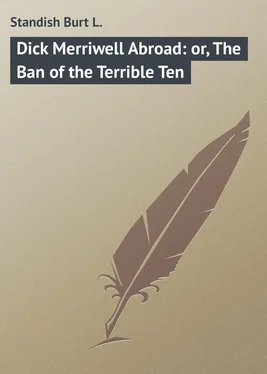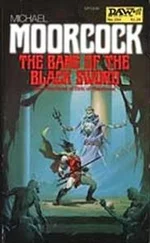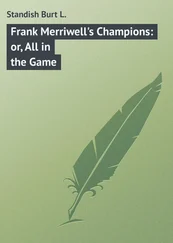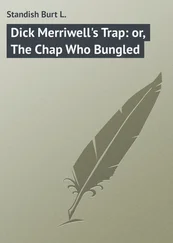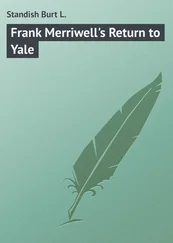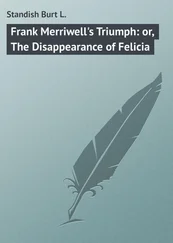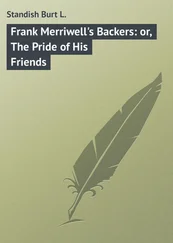Burt Standish - Dick Merriwell Abroad - or, The Ban of the Terrible Ten
Здесь есть возможность читать онлайн «Burt Standish - Dick Merriwell Abroad - or, The Ban of the Terrible Ten» — ознакомительный отрывок электронной книги совершенно бесплатно, а после прочтения отрывка купить полную версию. В некоторых случаях можно слушать аудио, скачать через торрент в формате fb2 и присутствует краткое содержание. Жанр: Прочие приключения, foreign_prose, на английском языке. Описание произведения, (предисловие) а так же отзывы посетителей доступны на портале библиотеки ЛибКат.
- Название:Dick Merriwell Abroad: or, The Ban of the Terrible Ten
- Автор:
- Жанр:
- Год:неизвестен
- ISBN:нет данных
- Рейтинг книги:5 / 5. Голосов: 1
-
Избранное:Добавить в избранное
- Отзывы:
-
Ваша оценка:
- 100
- 1
- 2
- 3
- 4
- 5
Dick Merriwell Abroad: or, The Ban of the Terrible Ten: краткое содержание, описание и аннотация
Предлагаем к чтению аннотацию, описание, краткое содержание или предисловие (зависит от того, что написал сам автор книги «Dick Merriwell Abroad: or, The Ban of the Terrible Ten»). Если вы не нашли необходимую информацию о книге — напишите в комментариях, мы постараемся отыскать её.
Dick Merriwell Abroad: or, The Ban of the Terrible Ten — читать онлайн ознакомительный отрывок
Ниже представлен текст книги, разбитый по страницам. Система сохранения места последней прочитанной страницы, позволяет с удобством читать онлайн бесплатно книгу «Dick Merriwell Abroad: or, The Ban of the Terrible Ten», без необходимости каждый раз заново искать на чём Вы остановились. Поставьте закладку, и сможете в любой момент перейти на страницу, на которой закончили чтение.
Интервал:
Закладка:
“What’s all right? What is it you don’t care about?”
“She didn’t have to write to me! She had a right to address the letter to you if she wished.”
Suddenly the truth dawned on Dick; Brad was hurt because Nadia had not addressed the letter to him.
“Well, you’re the limit for silliness!” Dick exclaimed.
“Perhaps I am,” grated Brad. “I can’t help it. I know I’m no prize beauty. I know that beside you I’m a half-finished shine. It’s all right! Of course, all the girls are bound to get struck on you. They can’t help it. But you’ve got girls enough!” he added, in resentful rebellion. “To say nothing of June Arlington, there is Doris Templeton and – ”
Dick put an arm round his friend and laughingly checked him.
“Don’t be such an ass, old man!” he entreated. “Nadia Budthorne is a beautiful girl, but I’m not struck on her, and – ”
“She is on you!”
“I don’t believe it.”
“Then explain some why she sent that letter to you. Why didn’t she address it to me or to the professor?”
“It just happened that way. You know I disguised myself as old Mr. Allsquint and in that manner exposed Bunol and his gang, and I suppose that is why – ”
“Perhaps so,” admitted the Texan suddenly. “I reckon I am an ass, pard! I always was, and it’s becoming more and more natural for me. Of course you can’t be to blame if Nadia took a liking to you. Why shouldn’t she like you more than me? You’re the best chap in the world, and I’m just a very common and a very ordinary chump, without any particular polish and without any pretense to good looks.”
“Brad,” said Dick earnestly, “you are one of the truest, finest, noblest fellows alive. Any one who comes to know you well can’t help liking you; and as for good looks – well, you bear the stamp of a man on your face, and therefore in the very best sense you are handsome. Stop running yourself down. What shall we do? Shall we light out of Edinburgh and make for Kinross and Lochleven to-day?”
“Instanter!” exclaimed the Texan eagerly. “Let’s not lose an hour, pard!”
CHAPTER III. – AT BEN CLEUCH INN
The Ben Cleuch Inn at Lochleven was kept by the Widow Myles, a plain, kind, motherly soul, the best part of whose life lay behind her.
The inn stood by the highway that wound close along the shore of the wooded lake, about a mile from Kinross.
In summers, visitors to Lochleven desirous of seeing Queen Mary’s island prison often patronized the little inn, and the widow thus derived revenue enough to keep her in frugal comfort through the long winters.
In November the strangers were few and far between, and glad the widow was when one dropped in for a meal or a night’s lodging. Doubly glad was she when two strangers, a young man and a beautiful girl of sixteen, came in a carriage to her door and bargained with her for rooms and board for several days, saying they expected to remain three days, and might, if they liked it, stay a great deal longer.
The landlady did her very best to please them, for they did not ask her to make her price smaller when she named it, and they readily paid for three days in advance. The girl, as Widow Myles could not help noticing, was very pretty, while the young man – her brother – looked pale and wearied and had about his face something indicative of weakness and irresolution. Indeed, he seemed on the verge of illness, and he permitted his sister to do most of the business with the landlady.
On the afternoon of the third day after the arrival of these guests another stranger appeared and stopped at the inn. He came afoot and wore a long, black cloak with a cape, while his wide-brimmed hat was pulled low over his eyes. His complexion was dark, and on his upper lip there was the shadowy outline of a new-born mustache.
Although the sun was shining without, there was snow on the ground and the air was nipping cold, which led the stranger to hold out his hands to the warmth of the widow’s cheerful open fire, in the little sitting room, having removed his gloves and placed them with his hat on the floor at his side.
“It’s cauld to-day, sir,” said the widow. “Th’ sun i’ ower bright, but the air ha’ a nippin’ in it.”
“Indeed it is cold, madam,” said the young stranger, in a pleasant voice. “It is far too cold for comfort. It must be frightful up here in the dead of winter.”
“Oh, it’s na sa bad – na sa bad,” protested the widow. “Wi’ a guide roof ower one’s haid an’ a warm fire to sit near, th’ winter soon runs awa’. Ha’ ye come fa’?”
“Not very far,” was the answer. “To me it would be a great favor, my good woman, if you could give me a drink of something warm to start my blood.”
“Tea?” suggested Widow Myles.
The visitor shook his head.
“I would prefer something warmer than that,” he said. “Have you any whisky in the house?”
“I canna tell. I much doot i’ I ha’!”
“Because if you have,” said the stranger, jingling some money in his hand, “I’ll pay well for a stiff drink.”
“I may ha’ a wee drap,” confessed the landlady. “I sometime’ ha’ it far me’cine.”
“It is for medicine I need it now, so if you will hasten, madam, you need but to name your price.”
The widow disappeared. After about ten minutes she reappeared with hot water, whisky and sugar, at sight of which the face of the stranger showed his satisfaction. Deftly and with loss of little time the stranger mixed his drink, tasted it, smacked his lips over it and then asked the widow to name her price.
She declined to state a price, whereupon he placed two pieces of money in her hand, and when she saw their value she showered him with thanks and called down blessings on his head.
In this manner the stranger placed himself right with the widow, whom he engaged in further conversation as he stretched his booted feet to the fire and sipped his steaming drink.
“At this season I presume few are the visitors who come here to stop?” he questioned.
“Few ye ma’ weel say,” she nodded.
“Is your house empty at the present time?”
“Na, na! not quite sa bad as that.”
“Then you have some guests?”
“I ha’ twa.”
“Two? How long have they been with you, madam?”
“They came three days gone, sir.”
“And is it long you expect them to remain?”
“As to that I canna tell. When they came they said it might be they wud stay three days or more; but it is now the third day an’ they have na spoke of leavin’.”
“I hope my curiosity you will pardon, but it seems strange any one should come here at this season to remain so long. Where are they from, if you don’t mind telling?”
“I ha’ na reason to know, for I didna ask them, but London I think ha seen them none sa lang ago.”
“They are English?”
The widow slowly shook her head.
“They are na like th’ English. I think they may be fra America.”
“I presume they are man and wife?”
“Na, na; they are brother an’ sister. A bonnie lassie is the girl, sir; but her brother seems na well.”
“Not well?”
“Na, sir. He keeps over close to his room. If they came to see Queen Mary’s prison they ha’ not yet accomplisht it.”
“It is not likely Americans would take so much trouble to get a look at Queen Mary’s prison, madam. It must be they are here for some other purpose.”
“Then what it can be heaven knows! Once I said to the lassie that her brother were fra too pale, an’ I thought a wee bit o’ whisky might be guide fa him; but she went white an’ trembly an’ begged me na to gi’ him one drop o’ it. She made me promise if he came and asked for it I wud say there was naething o’ th’ kind i’ th’ house. I ken she is feared to ha’ him drink it.”
Читать дальшеИнтервал:
Закладка:
Похожие книги на «Dick Merriwell Abroad: or, The Ban of the Terrible Ten»
Представляем Вашему вниманию похожие книги на «Dick Merriwell Abroad: or, The Ban of the Terrible Ten» списком для выбора. Мы отобрали схожую по названию и смыслу литературу в надежде предоставить читателям больше вариантов отыскать новые, интересные, ещё непрочитанные произведения.
Обсуждение, отзывы о книге «Dick Merriwell Abroad: or, The Ban of the Terrible Ten» и просто собственные мнения читателей. Оставьте ваши комментарии, напишите, что Вы думаете о произведении, его смысле или главных героях. Укажите что конкретно понравилось, а что нет, и почему Вы так считаете.
